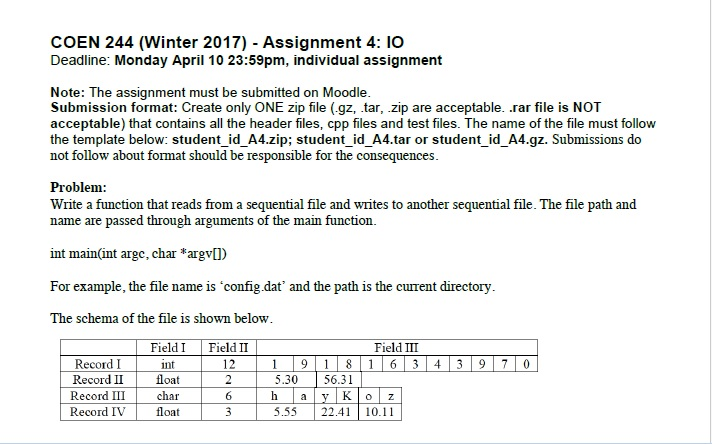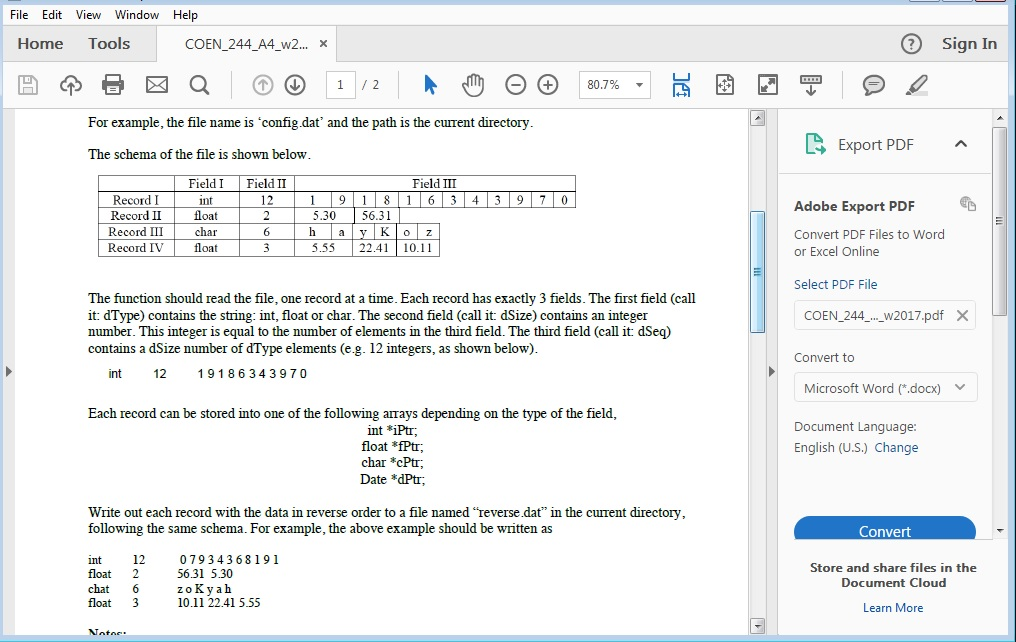Question
Notes: The solution should be general to processing any file with the same schema, not only applicable to the given file example. The program will


Notes: The solution should be general to processing any file with the same schema, not only applicable to the given file example. The program will be tested with data files with the same schema.
Assignment Marking Scheme
: Program correctness (75%)
Program indentation and readability (5%)
Choice of significant names for identifiers (5%)
Comments - description of variables and constants (5%)
/// MY IMPLEMENTATION OF THE CODE BUT I DONT KNOW WHAT I AM DOING WRONG NOTING IS OUTPUTTING :( !!!! THE CODE IS IN C ++ CAN SOMEONE PLEASE HELP ME BY DOING THE CORRECT IMPLEMENTATION OF THE CODE BY THE GIVEN GUIDELINE CAUSE DONT KNOW WHAT IM DOING WRONG
//// DataStorage.h//
class DataStorage{
private: //Pointers' data members
int *iPtr; //Private data member: pointer of type integer
float *fPtr; //Private data member: pointer of type float
char *cPtr; //Private data member: pointer of type character
// Date *dPtr;
int dSize;
public: //Member functions
DataStorage(); //Constructor
void setIntPtr(int*); //Member function that sets pointer as an integer type
void setFloatPtr(float*); //Member function that sets pointer as a float type
void setCharPtr(char*); //Member function that sets pointer as a character type
int* getIntPtr(); //Accessing function that returns a pointer of type integer
float* getFloatPtr(); //Accessing function that returns a pointer of type float
char* getCharPtr(); //Accessing function that returns a pointer of type character
};
///DataStorage.cpp/////////
#include
#include
#include "DataStorage.h"
#include
#include
#include
using namespace std;
//Constructor of the class DataStorage
DataStorage::DataStorage()
{
}
//end of constructor
//Member function that sets pointer as an integer type
void DataStorage::setIntPtr(int* intPtr)
{
iPtr = intPtr;
fPtr = 0;
cPtr = 0;
}
//end of setIntPtr function
//Member function that sets pointer as a float type
void DataStorage::setFloatPtr(float* floatPtr)
{
iPtr = 0;
fPtr = floatPtr;
cPtr = 0;
}
//end of setFloatPtr function
//Member function that sets pointer as a character type
void DataStorage::setCharPtr(char* charPtr)
{
iPtr = 0;
fPtr = 0;
cPtr = charPtr;
}
//end of setCharPtr function
//Accessing function that returns a pointer of type integer
int* DataStorage::getIntPtr()
{
return iPtr;
}
//end of getIntPtr function
//Accessing function that returns a pointer of type float
float* DataStorage::getFloatPtr()
{
return fPtr;
}
//end of getFloatPtr function
//Accessing function that returns a pointer of type character
char* DataStorage::getCharPtr()
{
return cPtr;
}
void readFile(DataStorage*& dsPtr, int* size) {
ifstream inFile;
inFile.open("config.dat");
// exit program if ifstream could not open file
if (!inFile) {
cout
exit(1);
}
char line[200];
int numLines=0;
inFile.unsetf(std::ios_base::skipws);
// find out how many lines the file has
unsigned line_count = count(std::istream_iterator
cout
dsPtr = new DataStorage[line_count + 1];
inFile.clear();
inFile.setf(std::ios_base::skipws);
inFile.seekg(0);
int totalLine = 0;
//Wrting the exception code
try{
while (!inFile.eof())
{
char dataType[10];
int dSize;
inFile >> dataType;
inFile >> dSize;
// cout
if (strcmp(dataType, "int") == 0)
{
int *iPtr = new int[dSize+1];
iPtr[0] = dSize;
for (int i = 1; i
inFile >> iPtr[i];
dsPtr[totalLine++].setIntPtr(iPtr);
}
else if (strcmp(dataType, "float") == 0)
{
float *fPtr = new float[dSize+1];
fPtr[0] = dSize;
for (int i = 1; i
inFile >> fPtr[i];
dsPtr[totalLine++].setFloatPtr(fPtr);
}
else if (strcmp(dataType, "char") == 0)
{
char *cPtr = new char[dSize+1];
cPtr[0] = dSize;
for (int i = 1; i
inFile >> cPtr[i];
dsPtr[totalLine++].setCharPtr(cPtr);
}
if(totalLine == 3){
break;
}
}
*size = totalLine;
}
//Trying to catch the exception
catch (exception e)
{
cout
}
inFile.close();
}
////driver.cpp/////////////////////////////
#include
#include
#include "DataStorage.h"
#include
#include
#include
using namespace std;
int main()
{
DataStorage* dsPtr;
int numLines=0;
//readFile("reverse.dat");
ofstream file("reverse.dat");
for (int i = 0; i
{
if (dsPtr[i].getCharPtr())
{
char* ptr = dsPtr[i].getCharPtr();
for (int j = (int)ptr[0]; j >= 0 ; j--){
file
cout
}
}
else if (dsPtr[i].getFloatPtr())
{
float* ptr = dsPtr[i].getFloatPtr();
for (int j = (int)ptr[0]; j >= 0 ; j--){
file
cout
}
}
else
{
cout
int* ptr = dsPtr[i].getIntPtr();
for (int j = 1 ; j
cout
}
cout
for (int j = (int)ptr[0]; j >= 0 ; j--){
file
cout
}
}
cout
file.close();
}
system("pause");
return 0;
}
//////config.dat/////////////
int 12 1 9 1 8 6 3 4 3 9 7 0 float 2 5.30 56.31 chat 6 h a y K o z float 3 5.55 22.41 10.11
//reverse.dat////
0 7 9 3 4 3 6 8 1 9 1 12 int 56.31 5.30 2 float z o K y a h 6 chat 10.11 22.41 5.55 3 float
COEN 244 (Winter 2017) Assignment 4: lo Deadline: Monday April 10 23:59pm, individual assignment Note: The assignment must be submitted on Moodle. Submission format: Create only ONE zip file (.gz, tar, .zip are acceptable. rar file is NOT acceptable) that contains all the header files, cpp files and test files. The name of the file must follow the template below: student id A4.zip; student id A4.tar or student id A4.gz. Submissions do not follow about format should be responsible for the consequences. Problem: Write a function that reads from a sequential file and writes to another sequential file. The file path and name are passed through arguments of the main function. int main int argc, char *argv0) For example, the file name is config dat, and the path is the current directory The schema of the file is shown below Field I Field II Field III int 12 1 1 81 6 3 4 3 9 70 Record I float 2 Record II 5.30 56.31 Record char (6 h a y K o z Record IV float 3 5.55 22.41 10.11
Step by Step Solution
There are 3 Steps involved in it
Step: 1

Get Instant Access to Expert-Tailored Solutions
See step-by-step solutions with expert insights and AI powered tools for academic success
Step: 2

Step: 3

Ace Your Homework with AI
Get the answers you need in no time with our AI-driven, step-by-step assistance
Get Started


